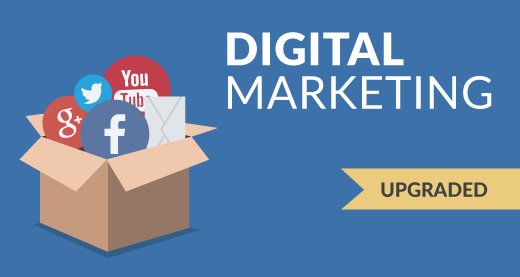

Digital marketing is constantly evolving, and keeping up with the latest trends is essential for businesses to stay competitive. The landscape has shifted dramatically in recent years, with new technologies, changing consumer behaviors, and innovative strategies redefining how brands engage with their audience. Whether you’re a business owner, a marketer, or just someone interested in the digital world, understanding these trends can help you make informed decisions.
Let’s understand in detail the most significant digital marketing trends for 2025.
- Artificial Intelligence (AI) in Marketing
AI is transforming digital marketing by automating processes, personalizing customer experiences, and improving decision-making. Marketers now use AI-powered tools for content creation, chatbots, customer segmentation, and predictive analytics. AI helps analyze vast amounts of data in real time, making campaigns more effective and targeted. For example, AI-driven chatbots provide instant customer support, improving engagement and satisfaction.
- Voice Search Optimization
With the growing use of voice assistants like Siri, Alexa, and Google Assistant, voice search is becoming a crucial aspect of digital marketing. Unlike traditional text-based searches, voice searches are more conversational and often in question format. Businesses need to optimize their content for voice queries by focusing on long-tail keywords, FAQs, and natural language patterns. This trend is especially important for local SEO, as many users ask for nearby services through voice search.
- Video Marketing Dominance
Video content continues to be a powerful marketing tool, with platforms like YouTube, TikTok, and Instagram Reels gaining massive popularity. Short-form videos, live streaming, and interactive video ads are some of the trends driving engagement. Videos help brands connect with their audience more effectively by delivering messages in an entertaining and easy-to-digest format. Businesses that leverage video marketing can boost brand awareness, engagement, and conversions.
- Social Commerce Growth
Social media platforms are no longer just for engagement; they have become powerful e-commerce channels. Platforms like Instagram, Facebook, and TikTok allow users to discover, shop, and purchase products without leaving the app. This trend, known as social commerce, enables brands to shorten the buyer journey and enhance customer convenience. Marketers should focus on creating visually appealing shoppable posts, leveraging influencer collaborations, and integrating seamless payment options.
- Personalization and Data-Driven Marketing
Consumers expect personalized experiences tailored to their preferences and behavior. Brands that use data analytics to deliver customized content, product recommendations, and targeted ads have a higher chance of building loyalty and increasing sales. Email marketing, dynamic website content, and personalized ads based on browsing history are some ways businesses are implementing this trend. Data privacy concerns, however, require marketers to find a balance between personalization and ethical data usage.
- Influencer Marketing Evolution
Influencer marketing is shifting from celebrity endorsements to micro and nano influencers. These influencers have smaller but highly engaged audiences, making them more effective for brand collaborations. Authenticity and trust play a crucial role in influencer marketing, and brands are now focusing on building long-term partnerships rather than one-time promotions. User-generated content and relatable storytelling are key elements that drive success in influencer campaigns.
- Content Marketing with AI and Human Touch
High-quality, informative, and engaging content remains the backbone of digital marketing. However, AI is playing a bigger role in content creation, helping marketers generate blog posts, social media captions, and product descriptions efficiently. While AI speeds up the process, human creativity is still essential for storytelling and emotional connections. The best content marketing strategy involves a blend of AI-driven efficiency and a human touch to maintain authenticity and relevance.
- Privacy-First Marketing
With increasing concerns over data privacy, businesses must adopt transparent and ethical data collection practices. The phasing out of third-party cookies means brands need to rely on first-party data and develop strategies like email marketing, loyalty programs, and customer surveys to gather insights. Privacy laws like GDPR and CCPA emphasize the importance of consent-based marketing, ensuring that consumers have control over their personal data.
- Marketing Automation for Efficiency
Automation is streamlining marketing processes, allowing brands to focus on strategy rather than repetitive tasks. Tools like email automation, chatbots, CRM software, and AI-driven analytics help businesses optimize their marketing efforts. Marketing automation not only improves efficiency but also enhances customer experience by delivering timely and relevant content.
- Augmented Reality (AR) and Virtual Reality (VR) in Marketing
AR and VR are revolutionizing how brands interact with consumers. AR allows users to visualize products in real-world settings before purchasing, enhancing the shopping experience. Brands in fashion, home decor, and beauty industries are leveraging AR for virtual try-ons. Similarly, VR is being used for immersive brand storytelling and interactive experiences, making marketing campaigns more engaging and memorable.
Digital marketing is evolving rapidly, and staying ahead of the curve requires businesses to embrace these trends. From AI-driven strategies to personalized content and social commerce, marketers must adapt to new technologies and consumer behaviors. Implementing these trends effectively can help brands enhance engagement, increase conversions, and build long-term customer relationships. As we progress, businesses prioritizing innovation and customer-centric strategies will thrive in the ever-changing digital landscape.


